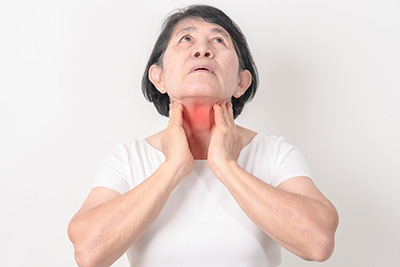Call Us: (754) 247-0122
Recognizing Early Signs of Hashimoto’s Disease

Fatigued? Gaining weight? Dry skin? Constipated more than usual? Experiencing an unusual sensitivity to cold? The early signs of Hashimoto's disease are usually subtle and can be easily overlooked.
South Florida's hot, humid climate can sometimes mask symptoms like cold intolerance. You don’t notice sensitivity to cold if it’s always hot and you are never cold. Hashimoto's disease, an autoimmune condition causing thyroid inflammation, is commonly associated with cold intolerance. It develops because Hashimoto's often leads to hypothyroidism, an underactive thyroid, which can slow your metabolism and decrease your body’s ability to generate heat.
You wouldn’t think the state you live in could play a role in Hashimoto’s Disease, but a seafood-rich diet, like many of us enjoy in South Florida, can lead to excessive iodine intake – a risk factor for developing Hashimoto’s.
It’s important to have a functional medicine doctor who specializes in both autoimmune and thyroid disease if you are potentially facing a condition like Hashimoto’s. Understanding the role various factors play in Hashimoto’s is essential to arrive at an accurate diagnosis and an effective treatment plan.
It’s not advisable to ignore the early symptoms of Hashimoto’s Disease. To schedule your consultation with Florida’s top integrative and functional medicine doctor who specializes in autoimmune disease and thyroid health issues, complete the form below or call us at (754) 247-0122 today!
What is Hashimoto’s Disease?
Hashimoto’s is the most common type of thyroiditis. It is an autoimmune disease where your body makes antibodies that attack the cells in your thyroid. Hashimoto’s causes the thyroid to produce too little thyroid hormone, leading to Hypothyroidism, or an underactive thyroid. In rare cases, it can lead to Hyperthyroidism, which involves an overactive thyroid.
Women are 4-10 times more likely than men to develop the disease. In the U.S., Hashimoto's is not only more common in women than men, but it's more frequent in white individuals compared to black individuals, and more common in low to middle income groups.
Many factors can increase the risk of developing Hashimoto's thyroiditis, including genetics, sex, age, pregnancy, other autoimmune diseases, radiation exposure, and excessive iodine intake. If you have one or more of the risk factors below – combined with one or more of the symptoms – it can help to give you an idea of whether Hashimoto’s Disease should be a concern for you.
- Genetics: Family history and genetic makeup play a role in whether or not you develop Hashimoto’s Disease. A history of either autoimmune disease or thyroid disease is especially relevant.
- Sex: Women are 4 to 10 times more likely to develop Hashimoto’s. It’s thought that hormones may play a role in the development of the condition in women.
- Age: Hashimoto’s is more likely to develop as you age. The disease often initially presents in middle age.
- Pregnancy: The hormones involved in pregnancy are thought to play a role in Hashimoto’s development during pregnancy.
- Other autoimmune diseases: If you have one or more autoimmune diseases, you are more likely to develop additional autoimmune conditions.
- Radiation exposure: Damage to the thyroid during radiation exposure can lead to Hashimoto’s.
- Excessive iodine intake: Too much iodine is a key risk factor for developing the disease.
Another factor most people don’t realize is that exposure to pesticides, pollutants, and chemicals can also influence autoimmune activity. So, choosing organic produce, limiting exposure to environmental pollutants, avoiding plastics (especially in proximity to the foods you eat) and using “green” household products can help mitigate these risks.
There is also a connection between Hashimoto’s, Leaky Gut, and parasites. Gut health issues like these can play a profound role in both thyroid health and autoimmune diseases like Hashimoto’s. Both parasites and Leaky Gut can act as triggers that help initiate or worsen the autoimmune attack, contributing to the inflammation and immune dysregulation that drive Hashimoto’s Disease. It is a complex interrelationship: Parasites can actually damage the intestinal lining – causing it to become "leaky" in the first place – which allows toxins to enter the bloodstream and trigger an immune response that can lead to autoimmunity. The imbalanced gut or dysbiosis that is associated with Leaky Gut can likewise increase susceptibility to parasitic infections. It can become a vicious cycle.
Early signs and symptoms of Hashimoto’s Disease
It’s easy to mistake some of the early symptoms for another condition or cause. For instance, who doesn’t feel tired sometimes. We all expect to lose some hair as we age. Difficulty losing weight appears to just be part of the human condition these days. Unless you’re working with a doctor who has years of experience diagnosing autoimmune conditions – especially those that affect the thyroid – Hashimoto’s Disease could be missed. Here are some of the early signs and symptoms to watch for:
- Fatigue
- Unexplained weight gain or difficulty losing weight
- Cold intolerance
- Memory problems
- Depression
- Muscle aches
- Irregular or heavy periods in women
- Dry, itchy skin
- Joint pain
- Hair loss
- Goiter (enlarged thyroid gland that causes a visible swelling in your neck)
- Constipation
To learn more about Hashimoto’s Disease and its effects on your physical and mental health - or any of the latest treatment options we offer at Manhattan Integrative Medicine of South Florida - contact us online or call to schedule your consultation with Florida’s top functional medicine physician and thyroid and autoimmune specialist. Complete the form below or call us at (754) 247-0122 today!
Why it’s important not to ignore early symptoms
Catching Hashimoto's in its initial stages is crucial because early diagnosis and treatment can also minimize the potential for long-term complications. When caught early, Hashimoto's can be effectively managed, allowing you to lead a healthy, normal life.
Timely intervention can prevent hypothyroidism and the serious health problems that can develop with hypothyroidism and its effects on your body. Untreated hypothyroidism can cause serious health problems, from heart disease, high cholesterol and high blood pressure to severe depression. It can even lead to a rare, potentially life-threatening condition known as myxedema coma.
Hashimoto's is linked to other health conditions like diabetes, rheumatoid arthritis and Addison's disease. Early management helps mitigate risk of these associated conditions.
Early detection allows for prompt treatment to prevent ongoing damage to your thyroid gland. The longer your immune system attacks your thyroid, the more likely you’ll experience permanent damage and the need for lifelong medication.
While Hashimoto's can sometimes initially cause a goiter (enlargement of the thyroid gland), early treatment can help prevent the goiter from developing.
What kind of doctor should I see for Hashimoto’s Disease?
Oftentimes, physicians provide one mistaken diagnosis after another simply because they do not know how to recognize, test and diagnose thyroid conditions or autoimmune diseases. That’s why it’s important to find a doctor who is not only experienced in dealing with thyroid function, but knowledgeable about autoimmune disease. You also want to work with an established functional and integrative medicine specialist, since both medical approaches are uniquely helpful in addressing Hashimoto’s Disease
Request your consultation today!
Dr. David Borenstein is a top functional medicine practitioner in Florida who recognizes that each patient requires a treatment regimen tailored to his or her individual health profile and specific symptoms. For over 20 years, Dr. Borenstein has been helping patients with autoimmune and thyroid conditions.
At Manhattan Integrative Medicine of South Florida, located in Boca Raton, FL, we offer the most up-to-date testing and treatment options. Compile your symptoms checklist and call Manhattan Integrative Medicine of South Florida in Boca Raton, FL at (754) 247-0122 or contact us online.
Serving patients in Boca Raton, West Palm Beach, Jupiter, Boynton Beach, Delray Beach, Parkland, Deerfield Beach, Pompano Beach, Coconut Creek, Coral Springs, Fort Lauderdale, Weston, Hollywood, Pembroke Pines, Aventura, Miami and the surrounding Palm Beach, Broward and Dade County, Florida communities.
Contact Us







